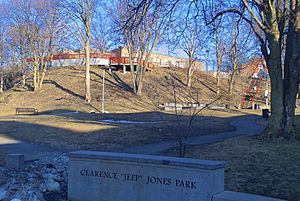Clarence "Jeep" Jones facts for kids
Quick facts for kids
Clarence "Jeep" Jones
|
|
|---|---|
| Born | April 17, 1933 |
| Died | February 1, 2020 (aged 86) |
| Nationality | American |
| Education | Winston-Salem State University |
| Occupation | Community Activist, City Official |
| Organization | City of Boston, Boston Redevelopment Authority |
| Known for | First African-American Deputy Mayor of Boston |
Clarence "Jeep" Jones (born April 17, 1933 – died February 1, 2020) was an American community activist. He worked hard to improve his community. Jeep Jones was very connected to the Roxbury neighborhood in Boston. This was true for his whole life and career.
Jones made history as the first African-American Deputy Mayor of Boston. He also worked for the Boston Redevelopment Authority for 32 years. For 24 of those years, he was the Chairman of its board.
Contents
Jeep Jones's Early Life
Clarence "Jeep" Jones was born in Boston, Massachusetts on April 17, 1933. He grew up in an area of Roxbury called Lower Roxbury. His childhood home was near Malcolm X Boulevard and Tremont Street.
A Diverse Neighborhood
Roxbury was a lively place when Jones was young. Many African-Americans and West Indians lived there. People from other countries also called it home. Jones remembered it as a "Neapolitan neighborhood." This meant it was a mix of many cultures. Everyone was very close-knit.
Sports and Friendship
At first, kids from different streets in Roxbury would often fight. But soon, they found a better way to connect. They started inviting each other to play football and basketball. Sports became a big part of their lives.
Boston, especially Roxbury, was known for its athletic talent. Basketball and track were very popular. These sports offered a great chance for young people from low-income families to go to college.
Jones played on a local basketball team. It had players from different high schools. This helped him see more of Boston. His team also traveled to Maine, New Hampshire, and Rhode Island. In Boston, Jones played in leagues at the YMCA. He and his friends also played at Madison Park and Columbus Park.
Jeep Jones's Education
As a young student, Jones went to Boston Public Schools. He attended the Dudley School and the Timilty School.
College Years
Jones chose to go to Winston-Salem State University in North Carolina. Many Boston athletes went there. Boston high schools had strong track programs. This made them a good place for college coaches to find new players.
A track coach from Winston-Salem State visited Boston. He was looking for a good, smaller basketball player. Jones was just what they needed.
At Winston-Salem, Jones was a four-year basketball player. He was part of the school's first championship team. This was the 1953 CIAA Champion basketball team. He also played track and field for two years. For three years, he managed the football team.
Later, Jones was honored in the C.E. "Big House" Gaines Athletic Hall of Fame. This was for his great achievements in basketball. While in college, he was good friends with many people from Boston, including Louis Farrakhan.
Jeep Jones's Career
After college, Jones served for two years in the United States Army.
Working for the Community
He then returned to Roxbury. He taught at the Dearborn School during the day. At night, he was a gym instructor at the Norfolk House. Later, he became a youth worker for the city. He called himself a "street worker." He helped young people in the community. He was then promoted to a supervisor role.
In 1965, Jones became a youth probation officer. This meant he helped young people who had trouble with the law. He worked in the juvenile court until 1968.
Working for the Mayor
In 1968, Mayor Kevin White asked Jones to work for him. Jones received more promotions. He even led the office of human rights. But he always stayed close to Roxbury youth. He also kept coaching basketball.
Jones served as the Deputy Mayor of Boston from 1968 to 1981. This was a very important job. He helped the mayor run the city.
Making History in Boston
Jeep Jones achieved many "firsts" as a city employee. He was the first African-American street worker. He was also the first African-American juvenile probation officer. And he was the first African-American Deputy Mayor. Later, he became the first African-American chairman of the BRA.
He served on the board of the BRA from 1981 to 2013. He was the chairman from 1989. He played a key role in building new parts of Boston. He helped change the city's skyline and neighborhoods.
During Mayor White's second term, Jones helped during the Boston busing desegregation time. He worked as a go-between for black community leaders and the city. He helped bring people together during a difficult period.
In 1988, Jones was on the BRA board. He helped give a non-profit group, the Dudley Street Neighborhood Initiative, special power. This group could control development in a 30-acre area. This was the first time in the country a non-profit had this power.
Jones also helped Mayor Ray Flynn. They worked to connect Boston's neighborhoods with the downtown area. Their efforts helped include more people in city planning. They also improved parts of the city that needed help.
Mayor Thomas Menino spoke about Jones in 2010. He said Jones was a "great role model" for all young people in Boston. He understood the city's neighborhoods and its kids.
Recognition
- In 2005, he received an honorary doctorate degree. This was in public service from Northeastern University.
- A park in Roxbury is named after him. It is called "Jeep" Jones Park. It opened in 2010.


